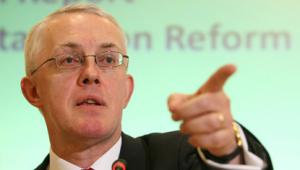By Lucy Phillips
26 January 2010
There will be ‘a cycle of bigger failures and bigger bail-outs’ unless the UK banking system is radically reformed, the governor of the Bank of England has warned.
Mervyn King was today speaking at a Treasury select Committee inquiry on whether financial institutions are ‘too important to fail’. He told the inquiry: ‘Unless we actually think about the deep structural issues that have led us to where we are, we are doomed to go through it again, but on a larger scale.’
But he said reform should not be rushed because it would risk harming the wider economy and its recovery from recession. ‘Changing things radically in the next two years would not be sensible... we need to have a lengthy transition which will be in the interest of the economy,’ King told the MPs.
King, together with BoE deputy governor Paul Tucker and executive director for financial stability Andy Haldane, admitted to the MPs that there was ‘a too big to fail’ mentality among the banks. It was assumed the government would step in to protect them, encouraging bigger risk-taking, they said.
The hearing came after US President Barack Obama last week set out his plans for a radical overhaul of the US banking system. They included limits on the size of institutions and a ban on proprietary trading. King welcomed the move, which ‘put reform on the table’, while Tucker said he backed the spirit of the president’s plans.
The three witnesses said reform should not put a limit on a bank’s size but create a ‘safer and more robust system’ that would not be dependent on taxpayer bail-outs. There was no ‘one ingredient’ for fixing it, since it would always be subject to unpredictable events. But a solution could involve imposing greater capital requirements on banks and the introduction of blueprints for action should a bank fail. More fundamentally, banks should change their liability structures so that creditors, not taxpayers, would bear the burden of risk and failure. The BoE representatives also predicted a move towards more subsidiaries instead of branches.
King said the case for reform was so strong that the UK should act alone if international agreement could not be reached. He said it was ‘not credible’ for Britain to house a banking system that was five times the size of its gross domestic product and reliant on taxpayer support. He hoped eventually it would be plausible for the UK government ‘to say no, we are not going to bail you out’.
King also revealed that there was not much support among the central banks for a ‘Tobin tax’ on financial transactions, and that a US-style levy (a charge on the liabilities of banks) was the preferred option.
26 January 2010
There will be ‘a cycle of bigger failures and bigger bail-outs’ unless the UK banking system is radically reformed, the governor of the Bank of England has warned.
Mervyn King was today speaking at a Treasury select Committee inquiry on whether financial institutions are ‘too important to fail’. He told the inquiry: ‘Unless we actually think about the deep structural issues that have led us to where we are, we are doomed to go through it again, but on a larger scale.’
But he said reform should not be rushed because it would risk harming the wider economy and its recovery from recession. ‘Changing things radically in the next two years would not be sensible... we need to have a lengthy transition which will be in the interest of the economy,’ King told the MPs.
King, together with BoE deputy governor Paul Tucker and executive director for financial stability Andy Haldane, admitted to the MPs that there was ‘a too big to fail’ mentality among the banks. It was assumed the government would step in to protect them, encouraging bigger risk-taking, they said.
The hearing came after US President Barack Obama last week set out his plans for a radical overhaul of the US banking system. They included limits on the size of institutions and a ban on proprietary trading. King welcomed the move, which ‘put reform on the table’, while Tucker said he backed the spirit of the president’s plans.
The three witnesses said reform should not put a limit on a bank’s size but create a ‘safer and more robust system’ that would not be dependent on taxpayer bail-outs. There was no ‘one ingredient’ for fixing it, since it would always be subject to unpredictable events. But a solution could involve imposing greater capital requirements on banks and the introduction of blueprints for action should a bank fail. More fundamentally, banks should change their liability structures so that creditors, not taxpayers, would bear the burden of risk and failure. The BoE representatives also predicted a move towards more subsidiaries instead of branches.
King said the case for reform was so strong that the UK should act alone if international agreement could not be reached. He said it was ‘not credible’ for Britain to house a banking system that was five times the size of its gross domestic product and reliant on taxpayer support. He hoped eventually it would be plausible for the UK government ‘to say no, we are not going to bail you out’.
King also revealed that there was not much support among the central banks for a ‘Tobin tax’ on financial transactions, and that a US-style levy (a charge on the liabilities of banks) was the preferred option.



















